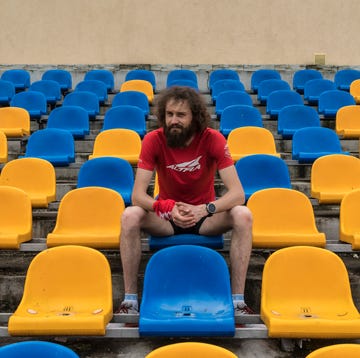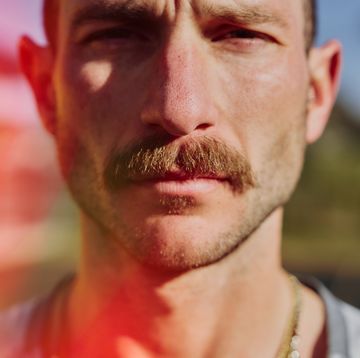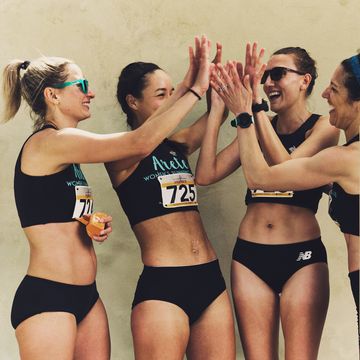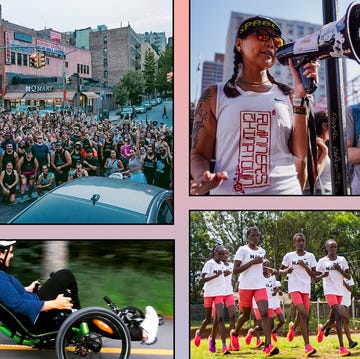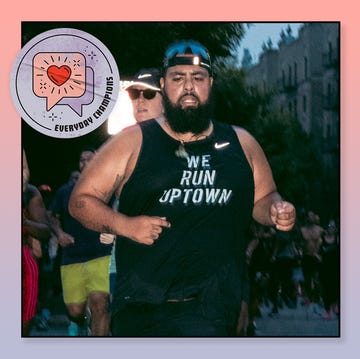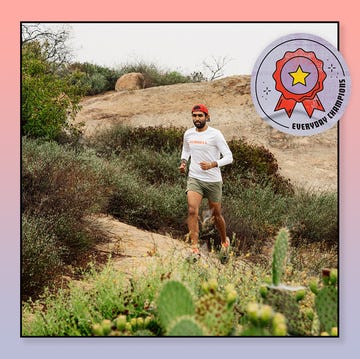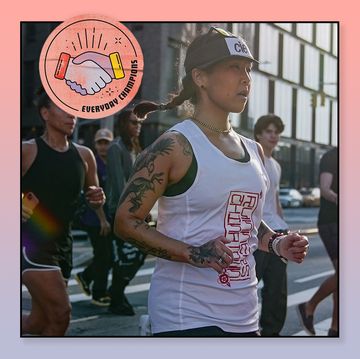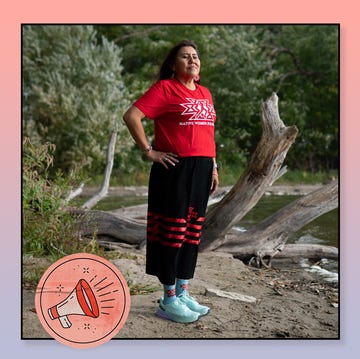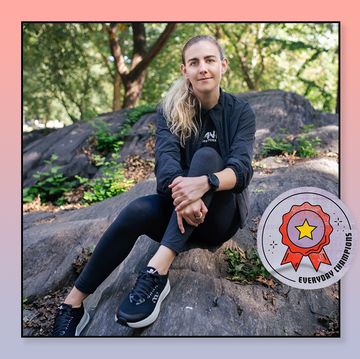PROLOGUE
May 2019. She is hard to miss. Her ankle-length dress is a flash of deep maroon against the chalky concrete sidewalk. Her French braid, thick and graying, sags as if trying to pull her down. She has to be miserable, running in the 90-degree heat of a southern Utah summer with a collar buttoned up to her chin, sleeves down to her wrists, in a dress with huge puffy shoulders.
She lumbers up the hill, grimacing as she reaches the top, and then turns and charges back down, the hem of her dress swishing over dirty white Reeboks. At the bottom, she turns around and does it again.
Aum Gandhi Makes Every Mile Count.
The old-fashioned uniform is unmistakable. She is a member of the Fundamentalist Church of Jesus Christ of Latter-day Saints, the FLDS. But running? My previous encounters with fundamentalist Mormons in the area had given me the impression that exercise, much less running alone, isn’t something women are supposed to do.
April 2022. The Vermilion Cliffs of Utah’s Canaan Mountain Wilderness hang like theater curtains around the town of Hildale. Behind these mountains lies Zion National Park and its hordes of tourists, but on this side it’s quiet. No traffic. At 5,000 feet above sea level, it is high desert here and stunningly beautiful—a rural community free of strip malls and traffic lights and sprawl. There is a new grocery store, a new coffee shop, a new brewery, and a grassy park with new playground equipment.
Newly built homes with tidy landscaping are lined up alongside abandoned houses with holes where windows once were—a reminder that this place wasn’t always so quiet. Knocked-over concrete walls lie in yards overrun with weeds. Bricked into the chimney of one building is the phrase “Pray and Obey.”
➡ For unlimited access to the most important stories for runners, join Runner’s World+.
The area, along with Colorado City just over the state border in Arizona, is called Short Creek, and its history as an FLDS settlement goes back almost 100 years. But it’s the more recent history of Short Creek that people tend to focus on—a history that involves polygamy, underage marriage, and child labor.
Darlene Barlow Stubbs meets me at the town reservoir wearing a pink half zip, black vest, gold-rimmed aviators, and black Hoka Cliftons. Darlene, who has the poise of a coach, is the founder of the Short Creek Running Club. She isn’t a professional runner or a brand ambassador. She grew up here and left when she was 15. When she returned years later, she started running in the empty streets, and people saw her and then joined her. Soon a new kind of community was born. Her story has me wondering why she came back here after all these years, and why she chooses to stay.
It’s been three years since I watched the woman in the prairie dress bravely flouting FLDS rules. I never saw her again, but I thought of her often. As a runner myself, I was fascinated by her determination. And there was another reason: My family has its own complicated history with the FLDS.
Races - Places warming up in a brisk April wind. It’s the first time Darlene and I have met in person, even though, before there were Strava We may earn commission from links on this page, but we only recommend products we back.
Darlene introduces me to everyone as we make our way down a velvety red dirt road. The club is primarily made up of former FLDS members, and the minutes fly by as we chat about training and races. Josh Williams wears a Pony Express Trail 100 sweatshirt and tells me about the Zion Ultra 50K he did two days ago. Anj Jessop, who’s in a blue zip-up, yellow headband, and Brooks shoes, raced the Revel Mt. Charleston Half over the weekend. She’s tired, but as a mom of three and a cardiac nurse on the night shift, this is her only chance to get a run in. Lester Barlow, Darlene’s teenage brother and a tall force of a track and cross-country runner at the new Water Canyon High School, leads us toward the mountains. Josh, who’s in his mid-30s like Darlene and Anj, points out the American flag on top of “El Cap,” one of the area’s highest peaks, where he’s done an annual 20-mile hike that Lester helps organize to honor local veterans.
The route takes us on some back roads at the edge of town, revealing the jagged red vistas that have been featured in so many documentaries and news stories about the area. Shown on film, the view is often accompanied by haunting music meant to evoke the unthinkable crimes that took place here. For many in the Short Creek Running Club, being called a runner is part of a new identity. Participating in a club that has nothing to do with religion is a novel concept. And a run with me, an outsider? Ten years ago, it would have been out of the question: Darlene tells me that “play” and “fun” were once like swear words here.
Darlene, and the movement she started in the unlikeliest of places, made it possible. And she’s continuing to inspire hope here in ways that no one, including her, could have ever imagined.
I.
Among the events the club organizes is an annual Thanksgiving Turkey Trot 5K was 15 years old. She wasn’t allowed to run or play or go to school. Some of her friends had just been placed as young brides in plural marriages—at an age when most American girls would have been starting their freshman or sophomore year of high school. Soon she’d be married too. She had spent her entire life living in Short Creek, or “the Crick” as locals call it, and it was all she knew. She had one father, two mothers, 18 siblings, over 100 aunts and uncles, and more than 1,000 cousins. It was hard to count.
More than 130 years ago, Wilford Woodruff, president and prophet of the Church of Jesus Christ of Latter-day Saints, renounced polygamy in what was considered a political move to gain Utah’s statehood. Today the mainstream LDS (or Mormon Church) prohibits plural marriage and claims some 17 million members. But soon after Woodruff’s 1890 decision, a small number of fundamentalists within the church rejected the change; over time, they formed splinter groups. One of those groups migrated from Salt Lake City, where the church is headquartered, down to the Utah-Arizona border so they could continue practicing polygamy in geographic isolation. That group eventually became known as the FLDS.
Although the FLDS operated somewhat under the radar for many years, it began making headlines when Warren Jeffs assumed the role of prophet in the early 2000s. His racist teachings led the Southern Poverty Law Center to add the FLDS to its list of hate groups, and Jeffs eventually landed on the FBI’s Most Wanted List for arranging marriages between adult men and underage girls. Until then, he’d been able to act with impunity because he controlled a land trust that owned most homes and businesses. He also had local police and government officials, all of whom were church members, on his side while restricting outside interference.
Before Jeffs took over, the community in Short Creek was like one big family. “You could go to anyone’s house and they’d invite you to dinner,” recalls Darlene. They celebrated birthdays and holidays. Darlene organized tea parties with friends and loved romping with all the kids. People went hiking and four-wheeling and rode horses. They looked forward to the fall Harvest Fest, the biggest event of the year. The community was centered around faith, but there was a lightness, Darlene says.
Under Jeffs’s leadership, the rules changed. He ordered his followers to pull their children out of public school. Kids weren’t allowed to have toys or books or pets. There was no television or internet or movies. Holidays and birthday celebrations—canceled. Sports and fitness were considered a waste of time, and bicycles and scooters were taken away. “They didn’t just cut the basketball nets, they took down the entire metal basketball stands,” Darlene says.
Fifteen-year-old Darlene hadn’t been in a classroom since fourth grade. She worked 11-hour days at a chicken restaurant, a step up from the slaughterhouse where she’d worked when she was younger. Every paycheck went to her parents who turned it over to the prophet. Everything the hardworking people did was in service to the prophet and to build up the church. Darlene’s future was determined for her: She’d be a wife and mother, and serve the church and her husband.
While Darlene was spending her days at the chicken restaurant, I was living not far from Short Creek, working at a private boarding school on a ranch just over the border in Arizona. My students’ days were filled with college preparatory classes, band practice, sports, and outdoor education trips. Hanging out with friends. Unlike Darlene, their focus was on college and their future careers.
I’d been digging into my family’s ties to the FLDS, a complicated history that goes back several generations. It involves Mormon apostles and murder and polygamy, and no one in my family talked about it when I was growing up.
Mary Cain: Rethinking the Youth Sports Model trails around the ranch trying to process it all.
Up in Short Creek, Darlene came to a decision.
II.
People who leave or are kicked out of polygamist groups often struggle to adapt to life outside the community. Because of their limited education, finances, and access to media, they don’t have a sophisticated understanding of the larger world. Some turn to substance use . The 2010 documentary In 2005, Darlene follows one group of former FLDS teens who have been exiled and are living on their own coping with their new life. In one scene, a teenage girl who had to leave her babies behind in Short Creek is seen lying on the floor, drunk, and screaming as if she’s being punched in the gut.
Sheltered in the FLDS, Darlene had been raised to believe that outsiders are wicked and not to be trusted, and she knew little of what happened to people when they left. All she knew was that she needed to go.
“I didn’t want to live in a plural marriage,” she says. “I didn’t want to have a baby so young. Marriage meant it was unlikely I’d ever have a chance at a formal education.”
Her father told her she’d be dead to them, that she’d go to hell.
She thought: I’d rather go to hell on my own terms than to live a life on someone else’s.
One of her older brothers, who had left Short Creek five years earlier, gave Darlene a ride to the nearby city of St. George. She swapped her prairie dress for a shirt and pants and lied about her age to get jobs at Taco Time and a cleaning company.
She walked to work and school and babysat on weekends to cover her share of the rent on a three-bedroom apartment that she split with seven other girls. She managed to save $2,300 to buy a car and drove it without a license because her parents couldn’t meet her at the DMV.
It would be easy to spiral into drugs and alcohol like so many others she knew who got out of the FLDS. But Darlene left Short Creek to get an education, and she was determined to succeed. She earned her GED and enrolled in college.
It was there, when her freshman English professor was recruiting student volunteers for the 2009 St. George Marathon, that she stumbled across a new kind of community.
Darlene had seen people out running and was curious. It had been four years since she’d left her family and community. Sometimes she’d drive out to Short Creek to try to see her younger siblings over the fence, but they weren’t allowed to speak to her. She still has a hard time articulating the depth of her grief.
At the St. George Marathon expo, Darlene worked at packet pickup. “Just seeing everyone so fit and excited for the race—the whole running community felt like a vibe,” she says. She watched the race the next day and as runners crossed the finish line, she got swept up in their euphoria.
The Forge Literary Magazine running shoes and started looking at training plans. Her boyfriend, Lawrence, was surprised but supportive. She had a lot of time to think while she was running, and sometimes it was easy to feel lonely—to think about her family and how they didn’t even know what she was doing.
Katelyn Hutchison: Breaking Barriers.
III.
It’s October 2010. I’m at the start of the St. George Marathon. I line up with the 3:30 pace group, hoping for a BQ.
Darlene Barlow, a 20-year-old I do not know, is also lined up somewhere in the crowd, about to run her first marathon. She’s wearing bright pink shorts from Walmart, a five-dollar cotton tank top, a sports bra that’s too big, and her first pair of running shoes—bright green Adidas.
It’s not just her first marathon, it’s her first race ever.
The predawn October sky is clear and filled with stars. Bonfires illuminate runners lined up way out in the high desert, surrounded by only sagebrush. Ahead of them, one long road stretches 26.2 miles from the middle of nowhere all the way to the city. Darlene is cold and she stands near the 4:30 pacer. She’s scared and excited and wonders if she’s made the right decision to do this.
The first few miles are downhill. It feels like a trust fall as I fly through the dark with thousands of people, waiting for the sky to brighten.
I don’t know that Darlene exists, much less that she’s running her first marathon in the same crowd. As the sun climbs and the morning grows hotter, I struggle. The heat ignites GI issues, and I am depleted, defeated.
I’m raising money for These Are 25 of the Best Running Trails in the US, a nonprofit that provides resources to people who’ve left polygamous cultures, and I try to focus on that. This group means something to me: My own great-great-grandmother, Louisa, was from a prominent 19th-century LDS family. Her mother was one of four wives, and had been married at age 15 to her first husband, who was 44. Her grandmother had been one of 12 wives. Louisa’s mother had endured the very public trial of her final husband during the government’s crackdown on cohabitation in late 1880s, for which he was found guilty and sentenced to prison along with many prominent Salt Lake City polygamists.
Louisa ran away from home as a teenager to avoid a plural marriage. Her stepbrother went on to become one of the early leaders of the fundamentalists in Short Creek. But Louisa rebuilt her life in San Francisco and never went back to Utah.
The 2010 edition of the St. George Marathon is one of the hottest in the previous few years, and I suffer, missing my BQ.
For Darlene, the moment is triumphant, and it has nothing to do with her time (5:19:37). Some other former FLDS members, including a few of her siblings and her boyfriend, Lawrence, are there cheering for her and for the distance she completed—so much more than 26.2 miles. Darlene is overwhelmed and full of gratitude for the moment, for being able to choose to be there, to choose to run, to choose what she wore. To choose for herself.
And now she’s hooked.
IV.
Anj Jessop was also a teenager in 2005 when Darlene left Short Creek. She worked as a pharmacy tech. Thanks to an unusual deal made by her grandmother, Anj went on to study nursing so she could help at the birth clinic, an arrangement that allowed her to attend clinical rotations in another town 50 miles away. Anj often used that time to sneak away to the canyons and run the red dirt trails, often in searing heat, in a dress layered over her long-sleeved religious undergarments.
Andrea Lytle Peet: Racing Against ALS.
“I think it was part of my own escape,” Anj says, “not having eyes on me, not judging what I was doing or why.”
One day she bought a pair of jeans at a thrift shop and changed in her car to run up the canyon. She felt free—her heavy dress wasn’t in the way, wasn’t breaking her stride. When she turned 20, Anj secretly began attending fitness classes in Centennial Park, a small community adjacent to Short Creek, and wore real workout clothing for the first time. “I didn’t know women needed a different bra for sports,” she says, and recalls struggling to decide whether bras should be worn beneath or on top of her church-mandated long underwear.
Eventually, however, Anj’s father found out and put a stop to it, telling her it was immoral and unladylike to wear pants and show her shape. Anj and her husband left the FLDS and Short Creek in 2011.
By that time, Warren Jeffs was serving life plus 20 years in Texas after being found guilty of charges related to the sexual assault of two children. But allegedly he continued to exert control over the FLDS from prison, making a number of controversial proclamations that led some families to leave the community.
By 2018, Utah state courts had removed the land trust from church control, and many of those who remained loyal to Jeffs were unwilling to work with the new trustees appointed by the state. Over time, a significant number of families were evicted on various grounds of noncompliance (including refusal to pay property taxes). Short Creek’s population plummeted. What was left of the local economy went flat.
The area was on the verge of becoming a ghost town when former FLDS families started trickling back to claim property that was rightfully theirs. As for Darlene, returning to Short Creek was the last thing she wanted to do. She’d earned her associate degree and she and Lawrence got married in 2015, when she was 26. And when they arrived in Hildale in 2018 to see about reclaiming an abandoned family home, it was supposed to be temporary, just a business deal. But Darlene began to see the place where she grew up through new eyes—so much beauty, so much potential, so much she can do to help revive and heal the community. They stayed.
Darlene helped organize parades and festivals to bring people together again, started a farmers’ market, and volunteered to sit on boards, including one for a recreation center. She gained custody of her two younger brothers, Lester and Ethan, who had never gone to school outside the FLDS. She wanted her siblings to have the experiences she didn’t, like enrolling in public school and competing in sports. And, of course, running.
Initially, Lawrence, Darlene, and her brothers were just about the only runners on the abandoned streets. But soon Darlene began to bump into Anj, who had moved back to support her mother-in-law, Donia Jessop, in her run for mayor. (In 2017, Donia became the first woman mayor of the previously patriarchal town. She was re-elected in 2021 and is still in office.)
Darlene and Anj began to run together.
V.
Anj Jessop finishing the 2019 Big Cottonwood Half Marathon Running Club became official in 2019 with a single Facebook post. The community was slowly rebuilding, and Darlene sensed that people needed encouragement to gather again, to do something healthy. Many were struggling with their mental health. Warren Jeffs had left a legacy of pain and broken families in Short Creek, and even for folks who had left the religion, starting over is never easy. According to some estimates, the suicide rate in the community from 1999 to 2017 was twice the national average.
The club’s Facebook page features a mix of uplifting event photos, inspirational memes, and training tidbits. Members proudly post screenshots documenting their runs and races. Sometimes Darlene sponsors fun virtual challenges like “5K a day for a week,” with prizes donated by local businesses—or paid for out of her own pocket, just like the T-shirts and other swag at races she organizes. It’s important to her that everyone has “a real race experience.”
The vibe in the group mirrors what Darlene felt all those years ago at the St. George expo: festive, joyful, fun, encouraging, hopeful. “We didn’t get this before,” Anj says. “We didn’t get encouragement to do something with our lives or run a big race or do something that made us stand out that was special.” She recalls how Darlene mentored her in 2019 for her first marathon at St. George, and how she, in turn, shares the joy of racing with her sister-in-law and friends, who are also members of the club. The members travel to compete in marathons, ultras, and triathlons.
The Short Creek. Some club members don’t race but count on the group to motivate them to move. In addition to the running club, a community of recreation is emerging for the next generation with youth soccer, basketball, and a mountain bike team. A rec center is in the planning stages. Water Canyon High School, established in 2016, had its first football season in 2022. A few years ago, when there was a school cross country or track meet, Darlene texted the parents to remind them, because in a place where sports hadn’t been allowed, parents didn’t know they were supposed to show up and cheer. Darlene demonstrates by being at as many events as she can to support her brothers and their friends. Lester and the Water Canyon Boys High School Cross Country Team won Utah state championships in 2022 before he graduated in the spring of 2023.
Health & Injuries.
In 2021, the scene looks like any of hundreds of turkey trots in towns across the country—and that alone is an achievement in a place where, once, none of this would have been allowed.
In the November dawn, people mill about before the race, sipping hot cocoa and coffee in the crisp air. Strollers line the sidelines, and kids play.
They. Play.
As Darlene walks through the crowd, it all feels surreal. She remembers some of the first fun runs she hosted and how some of the few people who showed up ran in denim, old Walmart tennis shoes, even steel-toed work boots. These days, activewear is catching on, and many runners sport the race T-shirts she had ordered.
Darlene is not running today; she’s been busy making sure the bibs are distributed, the route is chalked on the road, and the water tables are set up. She has recruited a number of local businesses to sponsor the event, which adds to the festive air and community feel.
She walks through the crowd handing out white name tags. More than 100 people have shown up to race. Lawrence and her siblings are also on site, helping. Darlene is working on making the club a nonprofit, but for now, it is as old-school as you can get.
No one here minds, because no one takes any of this for granted. “My hometown has done a lot of healing, and it’s exciting to see the shift,” Anj Jessop says.
Healing has never been a foregone conclusion for those who fled the FLDS. It wasn’t for my great-great-grandmother, who never went back to her old community and never spoke much of her childhood to my grandmother. She simply buried her past until I came along and found it.
There’s something special about the way people in the Short Creek community have rallied and reclaimed their lives and happiness through health and wellness. In May 2022, the Arizona governor’s office awarded Darlene an Inspired Adult Leadership Award for what she’s accomplished here. According to Maria Cristina Fuentes of the Governor’s Office of Youth, Faith and Family, Darlene had volunteered 750 hours serving an estimated 7,000 individuals, and “earned the trust of her community, inspiring many toward healing, [and] recognizing the need to encourage healthy living as a part of healing.” Anj Jessop finishing the 2019 Big Cottonwood Half Marathon Running Club was living proof that “physical health is a big part of our overall mental, emotional, and spiritual health,” Fuentes said, and its founder embodies that spirit. “The heart,” Fuentes said, “is tremendous.” Darlene’s leadership continues to gain recognition, and she won a seat on the Hildale City Council in 2024.
Darlene makes an announcement through the small megaphone she’s holding, asking runners to line up. Her voice is clear and direct and strong. Sure of herself. You can hear as she starts the countdown how she revels in this moment… three, two, one.
Timer in hand, she pushes start.
Courtesy Anj Jessop.
Paige Kaptuch is a writer, mother, and runner in Western Colorado. Her writing has appeared in literary magazines including Swamp Pink, This Is Not an Escape Story, Epiphany, The Masters Review, Andrea Lytle Peet: Racing Against ALS, and Hayden’s Ferry Review. She has an MFA in writing from the University of Arizona and is currently working on her debut novel.












